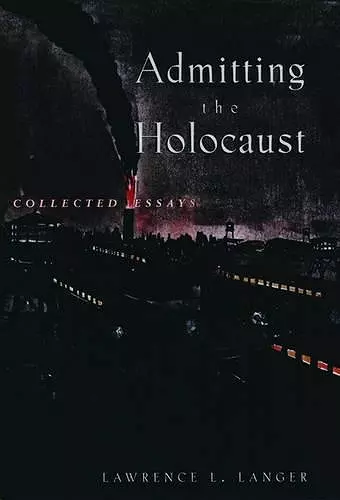Admitting the Holocaust
Collected Essays
Format:Paperback
Publisher:Oxford University Press Inc
Published:3rd Oct '96
Currently unavailable, and unfortunately no date known when it will be back

In the face of the Holocaust, writes Lawrence L. Langer, our age clings to the stable relics of faded eras, as if ideas like natural innocence, innate dignity, the inviolable spirit, and the triumph of art over reality were immured in some kind of immortal shrine, immune to the ravages of history and time. But these ideas have been ravaged, and in Admitting the Holocaust. Langer presents a series of essays that represent his effort, over nearly a decade, to wrestle with this rupture in human values--and to see the Holocaust as it really was. His vision is necessarily dark, but he does not see the Holocaust as a warrant for futility, or as a witness to the death of hope. It is a summons to reconsider our values and rethink what it means to be a human being. These penetrating and often gripping essays cover a wide range of issues, from the Holocaust's relation to time and memory, to its portrayal in literature, to its use and abuse by culture, to its role in reshaping our sense of history's legacy. In many, Langer examines the ways in which accounts of the Holocaust--in history, literature, film, and theology--have extended, and sometimes limited, our insight into an event that is often said to defy understanding itself. He singles out Cynthia Ozick as one of the few American writers who can meet the challenge of imagining mass murder without flinching and who can distinguish between myth and truth. On the other hand, he finds Bernard Malamud's literary treatment of the Holocaust never entirely successful (it seems to have been a threat to Malamud's vision of man's basic dignity) and he argues that William Styron's portrayal of the commandant of Auschwitz in Sophie's Choice pushed Nazi violence to the periphery of the novel, where it disturbed neither the author nor his readers. He is especially acute in his discussion of the language used to describe the Holocaust, arguing that much of it is used to console rather than to confront. He notes that when we speak of the survivor instead of the victim, of martyrdom instead of murder, regard being gassed as dying with dignity, or evoke the redemptive rather than grevious power of memory, we draw on...
"In this thought-provoking collection of essays, and in his excellent selection of Holocaust writings and paintings, Langer resists the temptations to glorify or falsify, but presents with unflinching honesty the legacy of the Holocaust and its devastating effect on its survivors and the world, whose recourse has often been denial."--Harvard Review
"Will be indispensable to everyone trying to understand the Holocaust....Langer's essays meticulously and compassionately examine ghetto chronicles, films, plays, and fiction by major writers....His voice is clear, persuasive, and compelling. He is one of the best guides into the disorienting world of writing about and remembering the Holocaust."--Detroit Free Press
"Superb...Langer offers a penetrating analysis of how many Western intellectuals and writers have sought to come to terms with the Holocaust."--Library Journal
"Important...bring[s] us back from the vacancy of words to the destiny of physical reality....Mr. Langer...illuminates the literature of the Holocaust--the chronicles of ghetto and camp, the fiction and poetry wrought out of the horror, the representations in film."--The New York Times Book Review
ISBN: 9780195106480
Dimensions: 140mm x 214mm x 15mm
Weight: 304g
224 pages